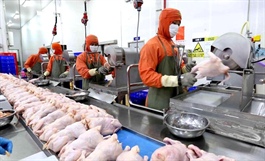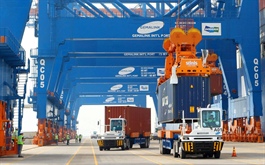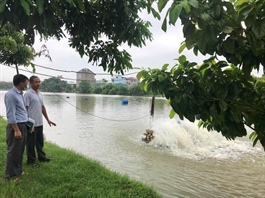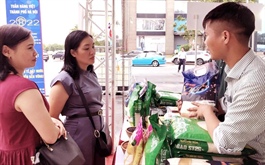Vietnam's retail giant WinCommerce takes substandard vegetables off shelves
Vietnam's retail giant WinCommerce takes substandard vegetables off shelves
Following the news about substandard vegetables labeled with Vietnamese Good Agricultural Practices (VietGAP) tags flooding WinMart supermarkets and WinMart+ convenience stores, WinCommerce, a subsidiary of local consumer goods giant Masan Group operating these outlets, immediately ceased the sale of such products.

A WinCommerce representative confirmed with Tuoi Tre (Youth) newspaper on Monday that Trinh Nhi Agricultural Products Co. Ltd. (TNFoods), which has a factory in the Phu Hoi Industrial Park in Duc Trong District, Lam Dong Province, supplies vegetables to its outlets.
Trinh Nhi’s vegetable products were found to be allegedly sourced from wholesale markets and failed to meet VietGAP standards but were labeled with VietGAP tags and supplied to local supermarkets.
WinCommerce also requested Trinh Nhi to explain its violations against its commitments to the quality and origin of products as stated in their contract.
The retail giant will provide more information after verifying the information.
The group also claimed responsibility for the issue and promised that it will review all remaining suppliers and tighten its quality control.
Substandard vegetables flood supermarkets
Many consumers are willing to pay higher prices for vegetables meeting safety or VietGAP standards. However, they never imagined that some companies might take vegetables from wholesale markets, put VietGAP labels on them and then sell them to supermarkets.
Investigating a vegetable processing unit located at the headquarters of Viager Co. Ltd. in Binh Chieu Ward, Thu Duc City, a district-level unit under Ho Chi Minh City, between August and mid-September, Tuoi Tre newspaper reporters learned how the unit turned vegetables bought from wholesale markets into VietGAP products from Da Lat City.
Every day at 10:00 pm, a man stopped his old motorbike in front of the processing unit, unloaded large bags of vegetables, and weighed them.
An old female worker named L. hurriedly recorded the vegetable volume before asking other workers to check whether the vegetables were withered or bruised.
After receiving batches of vegetables, including spring onion, coriander, dill, perilla, and basil, from the man, some workers discarded withered leaves and some others packed the remainder.
The processing unit even appointed an employee named Th. to negotiate, buy and change vegetables with these delivery men.
Between 6:00 and 8:00 am, workers of the processing unit stuck labels on vegetable bags and promptly handed them to drivers who transported the vegetables to supermarkets.
The labels include the phrase ‘vegetables from Da Lat’, the information about Trinh Nhi Company, and even the VietGAP logo issued by the Ministry of Agriculture and Rural Development.
Trinh Nhi’s vegetables are found to be supplied to well-known and large retailers.
Tuoi Tre reporters later saw a truck of Viager Co. Ltd. parked in front of Trinh Nhi’s vegetable processing unit every morning.
The truck driver and many employees loaded vegetables on the truck.
The first destination of the truck was the Linh Xuan Warehouse and Logistics Center on National Highway 1 in Thu Duc City.
At the center, D., an employee at the center, said this was the vegetable and fruit warehouse of WinMart for the central and southern region.
D. said he had repeatedly informed Trinh of the poor quality of vegetables. He even showed his text messages with Trinh.
In addition, the packaging dates on labels on vegetables were in the future. In other words, the products are delivered today but the printed packaging date is the next day.
Employees there said it was the warehouse of Tiki ngon, an arm of the ecommerce platform Tiki and showed a list of vegetables bought from Trinh Nhi.
On another day, the delivery driver was found to be traveling to a 3Sach food store on Hoang Dieu Street in District 4 and another on Tran Nao Street in Thu Duc City.
Vegetables from wholesale markets
One night, a vegetable delivery man said the herbs he transported to the vegetable processing unit in Thu Duc originated from the southwestern region.
If the unit needs any kind of vegetables, he will help buy them.
He added that he and his wife sell vegetables at Thu Duc wholesale market, which is several hundreds of meters from the processing unit.
In August, Tuoi Tre reporters came to the vegetable stall of the delivery man and said they wanted to buy vegetables for sale in supermarkets.
G., the delivery man’s wife, briskly introduced products and her text messages with Th. and Le Dang Nhat Trinh, director of Viager on Zalo.
She said her husband regularly hands over vegetables to the above-mentioned processing unit and they know that the unit purchases vegetables for sale to supermarkets.
As for the origin of her products, she said she buys them from any source with low prices in Binh Chanh District, Ho Chi Minh City, Da Lat, Vung Tau and Tien Giang, to compete with other traders at the wholesale market.
When asked if the vegetables meet VietGAP or other standards, the trader said ‘no’ with a shake of the head.
“In general, we just buy the products. We do not have any certificates. Neither do others at this market,” she added.
After determining the specific position of the vegetable stall, Tuoi Tre reporters kept a close watch on the process of transporting vegetables from the wholesale market to Trinh Nhi Company.
At 9:00 pm on August 24, G. and her husband arranged vegetables in a basket tied on a motorbike without a number plate.
The vehicle ran from the wholesale market to the processing unit, where its workers weighed and processed the vegetables.
Reporters on September 4 returned to ask G. about the VietGAP certificate, G. said farmers plant vegetables on a large scale and do not register for certificates, so they cannot provide certificates to traders.
Being asked about the supply of VietGAP vegetables, G. said the market sometimes fails to provide enough vegetables.
“We find it hard to sufficiently supply vegetables meeting VietGAP standards.”
The trader also said it is normal when her customers buy vegetables, stick VietGAP labels on them and sell them to supermarkets with high prices as they have to spend money hiring processors, inventory managers and accountants, and buying packaging products.
Meanwhile, most customers of supermarkets are rich and upper-class people. Thus, “VietGAP labels are aimed at ensuring supermarkets’ business."
Admitting violations
On September 14, a woman named Tr. representing Trinh Nhi Company said that the company supplies products to many distributors, mainly supermarkets in Ho Chi Minh City.
However, she affirmed that her company signed contracts to buy only products meeting VietGAP standards from Thu Duc wholesale market.
Meanwhile, the trader providing vegetables to Trinh Nhi Company said they have no VietGAP certificates for their products.
T., owner of a vegetable stall at Thu Duc wholesale market, said she could provide VietGAP certificates but the certificates are used for bad situations only.
T. added that many distributors choose vegetables at wholesale markets due to their low prices. They find it hard to compete with their rivals if they supply high-cost VietGAP products.
Many traders at Thu Duc wholesale market have also packed vegetables in small trays weighing 300-500 grams each and supplied to food stores and minimarts in apartment buildings.
Introducing trays of tomatoes, baby cucumbers, carrots, bell peppers, bitter melons, courgettes, and corns with VietGAP labels, B. said that the vegetables were mainly bought from Da Lat. Only bitter melons were purchased from the southwestern region.
Despite being marked with VietGAP labels, she admitted no vegetables at this market meet VietGAP standards.
Explaining why she does not sell VietGAP vegetables, the trader said their prices are high.
“The prices of goods sold at traditional markets fluctuate daily while the prices of VietGAP products are fixed, so they cannot be sold at the markets.”
In particular, the prices of VietGAP vegetables may be VND4,000-5,000 (US$0.17-0.21) higher than normal products.
Most buyers at the wholesale market care about prices first. It is not important if products meet VietGAP standards or not. VietGAP vegetables are rarely available at the market and they have no buyers, the trader added.
B. said sticking VietGAP labels on vegetables makes them more desirable.
At another stall, Th. introduced many kinds of vegetables, including hydroponic vegetables.
Besides a few trays of vegetables labeled with VietGAP tags, others are stamped with labels containing the phrase “Da Lat clean vegetables” and the vendor’s phone number.
However, just some products were packed in and transported from Da Lat.
“Labels are not important. Many people like the labels. VietGAP labels can be put on products easily,” Th. shared frankly, adding that no one at the market sells VietGAP goods.
Meanwhile, on the website of Trinh Nhi Agricultural Products Co., Ltd, it proudly states that “all products of the company are strictly controlled, from input materials to the production process to ensure the quality of products for consumers”.
In addition to the Da Lat origin and Global Gap certificates, the company boasts that it has received the ISO 22000:2005 certificate for its food safety management system and the VietGap certificate.
Besides being labeled with VietGAP tags, vegetables bought from wholesale markets were put on a dirty floor during the processing process, while workers wore shoes and walked on the floor.
Unpacked vegetables would be left on the floor to be packed the following day.
Meanwhile, vegetables meeting VietGAP standards, after being harvested, must be processed, classified, cleaned, packaged, sealed off and transported to outlets within two hours after being packaged to ensure hygiene and safety.
VietGAP vegetables are kept at 20 degrees Celsius for no more than two days.
Furthermore, workers have to process some 650 kilograms of vegetables or more than 90 kilograms per person daily. They were asked to buy gloves themselves, so most of the workers did not wear gloves.

























